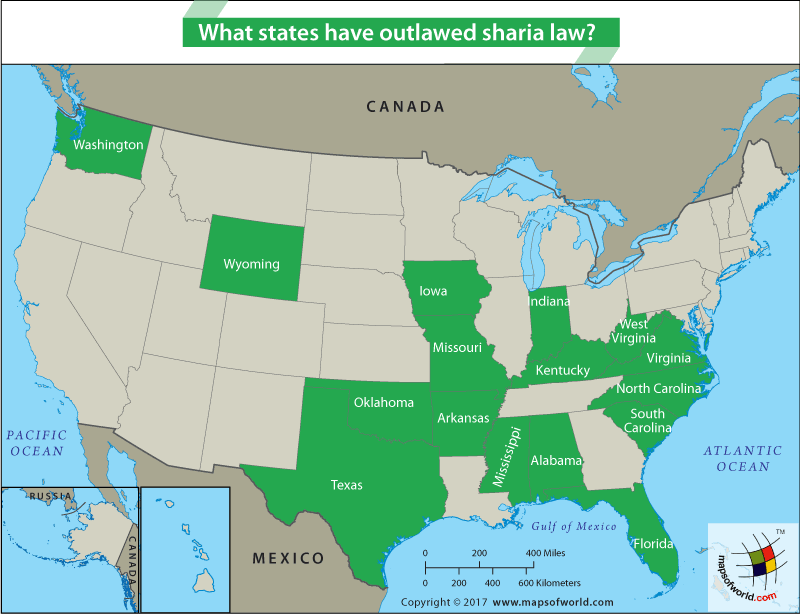

US Map highlighting states that have banned or restricted Sharia Law
The whole debate about banning of Sharia Law or Islamic Law in the United States arose with many instances where the Sharia Law came in conflict with civil law (non-religious) of the land. The result was that in the US, 16 states since 2013 have either prohibited the use of Sharia Law or have introduced legislations to ban or restrict it.
These states are:
Alabama (two bills)
Arkansas
Florida (two bills)
Indiana (two bills)
Iowa
Kentucky
Mississippi (four bills)
Missouri (two bills)
North Carolina
Oklahoma (seven bills)
South Carolina (two bills)
Texas (six bills)
Virginia
Washington
West Virginia
Wyoming (two bills)
Sharia is the Islamic law but in actuality is much more than merely a system of laws. It is a comprehensive code of behaviors that govern both private and public activities of Muslim individuals. It includes the discipline and principles that govern the interactions between communities, groups, and social and economic organizations. It governs the behavior of Muslim individuals towards themselves, their family, neighbors, community, city, nation and the Muslim polity as a whole.
The unfortunate development is that the Sharia has been made notorious by likes of Islamic State and other extremist groups.
Apart from this, there was fear in the US that increasing number of Muslim immigrants and the subsequent spread of Islam would make the state and local courts face instances where the civil law would be challenged by the Sharia Law and it would lead to the introduction of Sharia Law in the rulings. The ban was justified on grounds that it was only meant to ensure the supremacy of the American Constitution. These Sharia blocking laws were called ALAC, abbreviation for American Laws for American Courts. States adopted various measures to affect this ban including ballot measures and constitutional amendments or legislation.
Muslims Groups within the US, such as Council of American Muslim Relations (CAIR), along with those outside, have severely criticized these bans calling it discriminatory and Islamophobic. The Muslim Brotherhood raised its concern that these bans would in fact promote Islamophobia and further alienate the Muslim community.
In their defense, states acting on the ban hold that the legislations are not undermining any particular community’s constitutional rights. Rather, it was a reminder that public policy and law of the land must be held supreme. It should not be seen as an act of being anti-Muslim and was a measure to safeguard constitutional rights for the average American.
It is interesting to see that the contents of these bills do not specifically state banning of Sharia Law. The bills talk about banning the application of any foreign law, legal code or legal system that doesn’t grant the same rights and privileges as the state or US Constitution.
The bills have been introduced in 16 states in the US and it is likely that the numbers will grow in time, an opinion held by some in the US and those working in the state legislatures. On an average, 15 to 30 states are expected to raise the proposal in a given year.
The Muslim Groups inside the country continue to see these bans as severely anti-Muslim
and something that would push American Muslims towards more alienation.
Note: Map of the US with all the state divisions, showing the ones that have passed laws against Sharia; on the same map Muslim population in the US can also be highlighted.
Related Maps:
The Republic of Madagascar is an island country located in the Indian Ocean, off the…
The Euro is the official currency of the European Union. It is, however, not incumbent…
There are many countries or regions that are partially recognized by the UN, have disputes…
The Alaska Statehood Act was signed into law by President Dwight D. Eisenhower in 1958,…
The name Persia may, however, only be used to refer to Iran in some contexts.…
Hawaii is an Island State in the US. It is one of the 50 states…